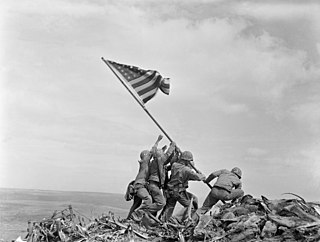
The Battle of Iwo Jima was a major battle in which the United States Marine Corps (USMC) and United States Navy (USN) landed on and eventually captured the island of Iwo Jima from the Imperial Japanese Army (IJA) during World War II. The American invasion, designated Operation Detachment, had the purpose of capturing the island with its two airfields: South Field and Central Field.

The 5th Marine Division was a United States Marine Corps ground combat division which was activated on 11 November 1943 at Camp Pendleton, California during World War II. The 5th Division saw its first combat action during the Battle of Iwo Jima in 1945 where it sustained the highest number of casualties of the three Marine divisions of the V Amphibious Corps. The 5th Division was to be part of the planned invasion of the Japan homeland before Japan surrendered. Assault troops of the 5th Division were included in the Presidential Unit Citation awarded to the V Amphibious Corps for extraordinary heroism on Iwo Jima from 19 to 28 February 1945. The 5th Division was deactivated on 5 February 1946.

Joseph Jeremiah McCarthy was a mustang officer in the United States Marine Corps Reserve, who served during World War II and the Korean War. He was also the Superintendent of Ambulances in the Chicago Fire Department; however, with respect for his wartime heroics, firefighters continued to address him by his wartime military rank of “Captain.”
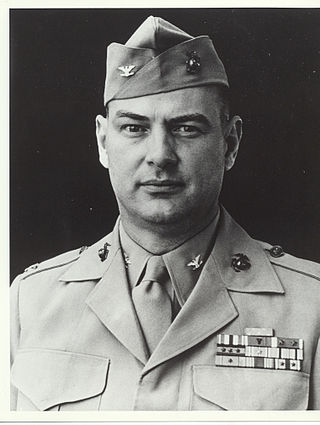
Colonel Justice Marion Chambers was a United States Marine Corps officer who received the Medal of Honor for actions in World War II during the Iwo Jima campaign.
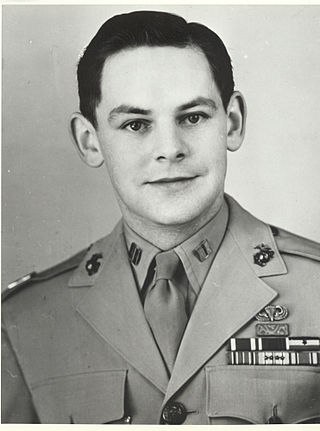
Robert Hugo Dunlap was a United States Marine Corps major who received the Medal of Honor for heroism above and beyond the call of duty as a captain of a rifle company during the Battle of Iwo Jima in World War II.

Jacklyn Harold "Jack" Lucas was an American Marine in World War II who was awarded the Medal of Honor at the age of 17 years as a private first class in the Marine Corps during the Battle of Iwo Jima.

Captain John Harold Leims was a Marine who was awarded the Medal of Honor as a second lieutenant on Iwo Jima for his heroic actions on March 7, 1945.
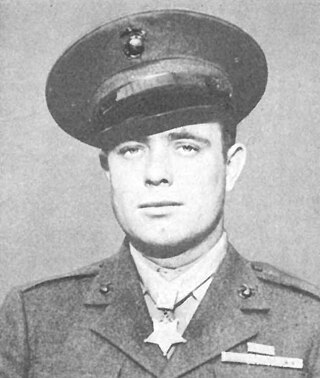
Hershel Woodrow "Woody" Williams was a United States Marine Corps Reserve warrant officer and United States Department of Veterans Affairs veterans service representative who received the Medal of Honor, the United States military's highest decoration for valor, for heroism above and beyond the call of duty during the Battle of Iwo Jima in World War II. Williams was the last living Medal of Honor recipient from World War II.

William George Harrell was a United States Marine who was awarded his nation's highest military honor – the Medal of Honor – for his heroic actions in the Battle of Iwo Jima.
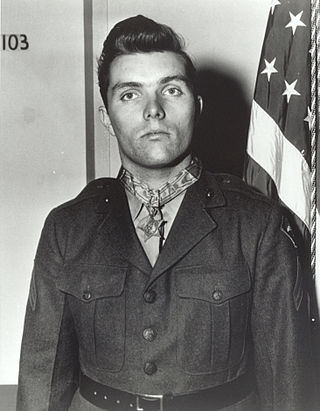
Major Douglas Thomas Jacobson was a United States Marine who earned the United States' highest military honor — the Medal of Honor — for his heroic actions on Iwo Jima during World War II. "Private First Class Jacobson destroyed a total of sixteen enemy positions and annihilated approximately seventy-five Japanese, thereby contributing essentially to the success of his division's operations." He was presented the Medal of Honor by President Harry S. Truman on October 5, 1945.

Wilson Douglas Watson was a United States Marine Corps private who received the Medal of Honor for his actions on Iwo Jima during World War II. He single-handedly killed 60 enemy soldiers, thus enabling his platoon to advance, earning him the name "One-Man Regiment of Iwo Jima". After World War II, Watson continued his military service in the United States Army. At the time he retired, he held the rank of Staff Sergeant.

Gunnery Sergeant William Gary Walsh was a United States Marine who heroically sacrificed his life to save the lives of his fellow Marines during the Battle of Iwo Jima during World War II. For his actions on February 27, 1945, he posthumously received the Medal of Honor.
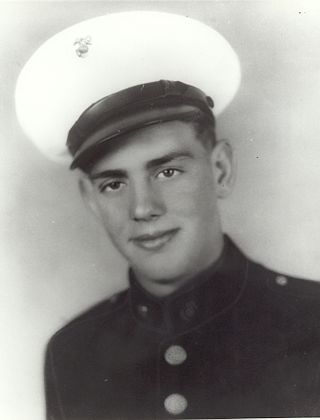
Private George Phillips was a United States Marine who was posthumously awarded the Medal of Honor for sacrificing his own life to save the lives of fellow Marines on Iwo Jima by throwing himself over an activated hand grenade.

Tony Stein was a United States Marine who posthumously received the U.S. military's highest decoration, the Medal of Honor, for his actions in World War II. He received the award for repeatedly making single-handed assaults against the enemy and for aiding wounded Marines during the initial assault on Iwo Jima on February 19, 1945. He was killed in action ten days later.

The 3rd Battalion, 9th Marines (3/9) is an infantry battalion of the United States Marine Corps. Formed during World War I it served until the early 1990s when it was redesignated as 3rd Battalion, 4th Marines (3/4) during a realignment and renumbering of the Marine Corps' infantry battalions, following the deactivation of the 9th Marine Regiment. The 3rd Battalion, 9th Marines was initially a subordinate unit of the 9th Marine Regiment, 3rd Marine Division, but was later operationally transferred to the 1st Marine Division as a subordinate unit of the 7th Marine Regiment where it remained until its redesignation as 3/4.

The 2nd Battalion, 28th Marine Regiment is an infantry battalion of the United States Marine Corps. The battalion which is part of the 28th Marine Regiment, 5th Marine Division, fought in the Battle of Iwo Jima during World War II. Six Marines of E Company, 2nd Battalion, 28th Marines were featured in the historical photo by Joe Rosenthal of the U.S. flag raising on top of Mount Suribachi.
Harold George Schrier was a United States Marine Corps lieutenant colonel who served in World War II and the Korean War. In World War II, he was awarded the Navy Cross for leading the patrol that captured the top of Mount Suribachi, where he helped raise the first U.S. flag on Iwo Jima on February 23, 1945. In the Korean War, he was wounded in North Korea during the Battle of Chosin Reservoir while commanding a rifle company.
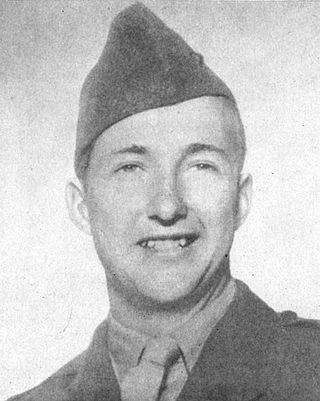
Jack Williams was a United States Navy hospital corpsman who was killed in action while serving with a Marine Corps infantry unit in World War II. He was posthumously awarded the nation's highest military decoration for valor, the Medal of Honor, for heroic actions "above and beyond the call of duty" on March 3, 1945, during the Battle of Iwo Jima.
The 3rd Battalion, 28th Marines (3/28) is an inactive infantry battalion of the United States Marine Corps. They were part of the 28th Marine Regiment and 5th Marine Division and fought during the Battle of Iwo Jima in World War II. They were activated again for the Vietnam War but were deactivated after the war and remain inactive today.

















